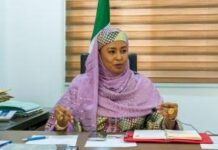By Francis Ogwo
The era of pre-registered SIM cards either at open markets or at other places across Nigeria has ended.
This was disclosed by the Minister of Communications and Digital Economy, Dr Isa Ibrahim Pantami on Monday while speaking to newsmen.
According to the Minister, the ministry has eradicated the problem of preregistered SIM cards while stating that the use of preregistered SIM cards for criminal activities had been curbed to a reduced level within the last 11 months of assumption of office.
He also added that he directed the Nigerian Communications Commission (NCC) to block 9.4million SIM cards not properly registered.
‘’Last week I was on a programme on a radio station in Kaduna and they said there were still preregistered cards in the markets. I challenged them to go and buy SIM card to show whether they are right or not. I said if they are found to be right that means some sanctions would be slammed on some people either within government or outside the government. But they went through markets in Kaduna, and they came back with no preregistered SIM,”
Pantami also said he had also intervened on the issue of Right of Way (RoW) charges with the state governors, resulting in the reduction of the charges from N5,500 per linear metre to N1 per kilometre of fibre in Kwara State and from N600 per linear metre to N0 in Anambra State, while some other states had settled for N145 kilometre of fibre.
He believed that the decision would go in long way in supporting the execution of the National Broadband Plan (NBP) launched by President Muhammadu Buhari on March 19, this year, and impact positively on the economy.
“One of the key benefits is the rapid growth in the gross domestic product (GDP) of any country that increases its broadband penetration,” he said.
The Minister disclosed that work had already started on the new National Broadband Plan 2020-2025 as the country had attained 40.18% broadband penetration while adding that the new plan would ensure that 90% of Nigeria population has access to broadband, while it is also expected that the country achieve 70% broadband penetration by year 2025.
“For many years, the broadband penetration remained 31% and that is about 1% or 1.5% growth per annum. But within one year of our coming on board, the broadband penetration grew by about 10% and it now stands at 40.18%,” he said.
Pantami explained that following the launch of the National Broadband Policy by the President, certain steps have been taken by the authorities to address major challenges inhibiting the growth and development of the telecommunication industry.
“It is heart-warming that Mr. President has also directed that the Office of the National Security Adviser (ONSA) should coordinate the protection of telecommunications and ICT infrastructures across the country.
“And an Executive Order is right on the table of Mr. President on the protection of the nation’s National Critical Infrastructures. The Executive Order is expected to accommodate everything regarding the ICT sector in the country.”
He further explained implementation of the broadband policy goes beyond access to internet, stressing that government is targeting the transformation of the economy with the creation of millions of jobs, higher standard of living for the people as well as economic growth and development for the country.











